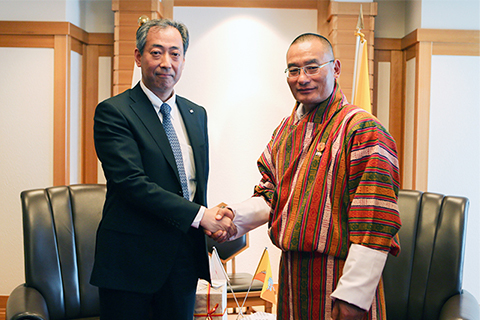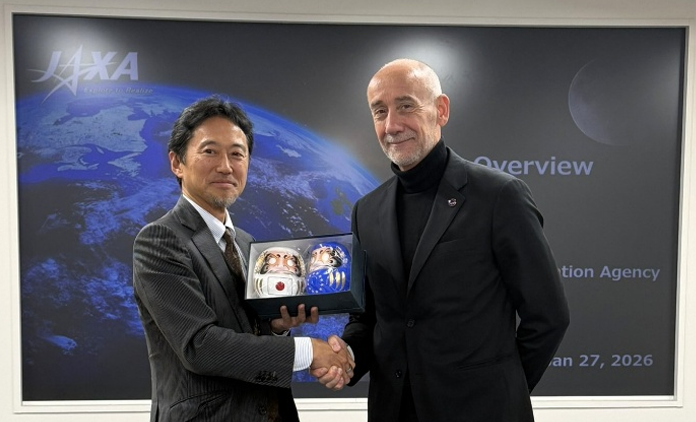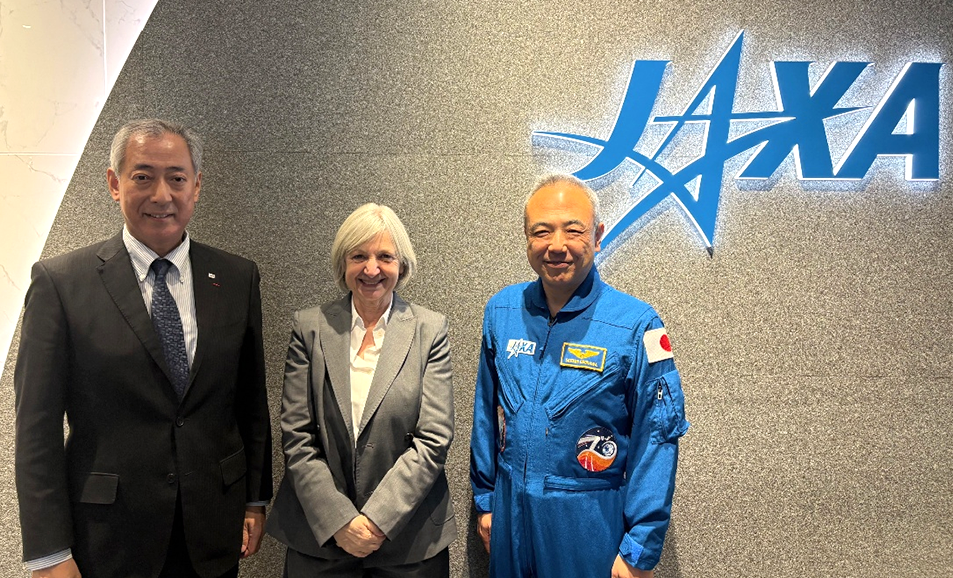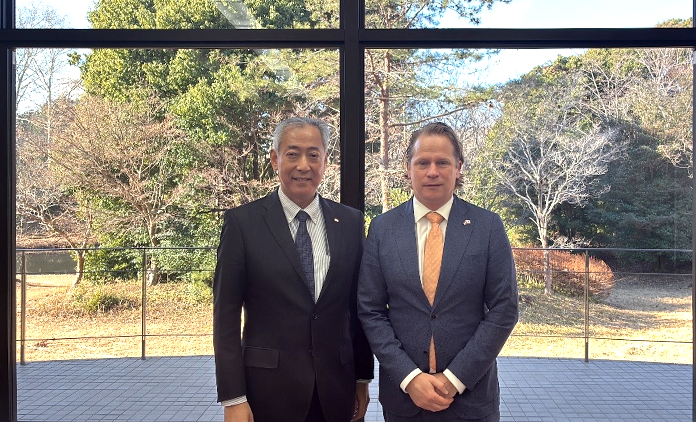Project Topics
indexGerman National Day Special Event "Beyond Planet Earth – German-Japanese Cooperation in Space”
|
On June 20, 2025, the German National Day Special Event “Beyond Planet Earth – German-Japanese Cooperation in Space” was held at the Osaka Kansai Expo, organized by the German Aerospace Center (DLR) and supported by the Japanese-German Center Berlin (JDZB) and JAXA. This public event was attended by H.E. Dr. Frank-Walter Steinmeier, President of the Federal Republic of Germany, Ms. Dorothee Bär, Federal Minister of Research, Technology and Space, Mr. KOGA Yuichiro, State Minister ... |
Press Release
index-
- Feb. 9, 2026 (14:00) [release]
- Successful Deployment of Mexican Satellite Gxiba-1, Selected in the Sixth Round of KiboCUBE Programme
-
- Nov. 20, 2024 (15:00) [release]
- JAXA-ESA Joint Statement on Next Big Cooperations
Guests from abroad
indexAbout International Cooperation
|
JAXA puts emphasis on international cooperation, and currently most of the projects have been conducted through international cooperation. |

|
|---|
Collaborative organizations
United States and Canada
International cooperation between the United States and Japan started in 1969, when "The
Japan-U.S. Joint Communique" on cooperation in space development was exchanged. Since then, JAXA
has been participating in international projects, which have been mainly led by the National
Aeronautics and Space Administration (NASA) such as the International Space Station, by
dispatching Japanese astronauts on Space Shuttle missions, earth observations, and scientific
satellite missions.
We regularly hold a Japan-Canada Space Panel with the Canadian Space Agency to exchange opinions
on earth observations, microgravity technology, and other fields in view of a long-term mutual
cooperation agreement made in 1989. We are also cooperating as a partner in the International
Space Station project. In March 2012, the Memorandum for Promotion of Space Cooperation between
Japan and Canada was signed between both governments, in order to promote and organize
cooperative activities between the agencies over the use of outer space.
Reference
- National Aeronautics and Space Administration (NASA)External Link
- Canadian Space Agency (CSA)External Link
Europe and Russia
International cooperation between Europe and Japan started in 1972 with an exchange of
information under official notes concluded with the European Space Agency (ESA) on cooperation
in space exploration.
With the start of the 1980s, Japan's involvement with European partners increased. This
partnership now includes mutual support between the space agencies of Japan and France (the
Centre National D'Etudes Spatiales: CNES) in the launch of satellites. JAXA established a Mobile
Tracking and Data Acquisition Station in Kiruna, Sweden, with the Swedish Space Corporation
(SSC). A space experiment was also conducted in cooperation with the Russian Space Agency (FSA),
using the Russian space station, Mir. These activities help to further international cooperation
in earth observations between Japan and its European partners. Russia is the only country in
Europe which has previous experience in space-station operations, and its know-how can make a
significant contribution to the International Space Station project.
In this region, JAXA concluded an Inter-Agency agreement between ASI (Italy)CNES (France), DLR
(Germany), ESA, FSA (Russia), NSC (Norway),
NSO (Netherland), SNSB (Sweden).
Reference
- Russian Federal Space Agency (FSA) * RussianExternal Link
- European Space Agency (ESA)External Link
- UK Space Agency (UKSA)External Link
- Centre National d’Etudes Spatiales (CNES)External Link
- German Aerospace Center (DLR)External Link
- Italian Space Agency (ASI)External Link
- Swedish Space Corporation (SSC)External Link
- Norwegian Space Centre (NSC)External Link
Asia Pacific Region
In the field of satellites, the relationship between Japan and Asian countries started in 1988, when the data from the Marine Observation Satellite-1 (MOS-1) of the National Space Development Agency of Japan (NASDA, now JAXA) was directly received from space in Thailand. Since then, JAXA has increased its cooperative partners in the Asia-Pacific region such as Indonesia, India and Vietnam, while expanding the scope of cooperation, from remote sensing areas to the fields of communication, positioning, space science, utilization of the ISS and capacity building. In the field of space transportation, NASDA established a downrange station in 1976 with support from the Kiribati government on Christmas Island in the South Pacific Ocean, which is located near the launcher flight path. JAXA is using the station to monitor launcher flights. JAXA concluded framework agreements with 5 countries in the Asia-Pacific region as well as many memorandums of understanding for individual cooperation.
Asia-Pacific Regional Space Agency Forum, APRSAF
In 1993, Japan led the establishment of the Asia-Pacific Regional Space Agency Forum (APRSAF).
The APRSAF holds a regular meeting on international cooperation in the Asian Pacific region and
42 countries and regions and 27 international organizations participate. In 2006, the
"Sentinel-Asia (Asian supervisors)" was inaugurated to construct an "Asian disaster preparation
and risk management system" and this now comprises 79 organizations from 25 countries and 14
international organizations.
In 2008, the Space Application for Environment (SAFE) project was established as a collaborative
effort to monitor environmental changes on Earth by using earth observation satellites of the
member countries of the Asia-Pacific Regional Space Agency Forum (APRSAF). In these projects,
further collaborative activities will be expected by using the Advanced Land Observing
Satellite-2 (ALOS-2) and Global Satellite Mapping of Precipitation (GSMaP).
Reference
About Asia Pacific Region
About Asia-Pacific Regional Space Agency Forum, APRSAF
- Asia-Pacific Regional Space Agency Forum (APRSAF)External Link
- Sentinel-AsiaExternal Link
- SAFE Portal Site
- Regional Readiness Review For Key Climate Missions (Climate R3)External Link
- Asian Beneficial Collaboration through" Kibo" Utilization (Kibo-ABC)External Link
- * Japanese
International collaboration through international organizations such as the United Nations
JAXA actively participates and supports various activities as a member of global and regional organizations such as the United Nations Committee on the Peaceful Uses of Outer Space (COPUOS) and the Committee on Earth Observation Satellites (CEOS.) COPUOS discusses issues concerning exploration and peaceful uses of outer space and submits recommendations and proposals to the UN general assembly. CEOS was established in 1984 to coordinate technical issues and exchange information on earth observation satellite systems. JAXA also sends its officials under agreements to the United Nations Office for Outer Space Affairs (UNOOSA), the United Nations Economic and Social Commission for Asia and the Pacific (ESCAP), the International Space University (ISU) and the Asian Institute of Technology (AIT).
Science Satellite
In the field of scientific satellites, it is significant to promote research under international cooperation. Cooperative work for space science is performed at various levels including the Inter-Agency Consultative Group (IACG) for space science, which was established thanks to the Halley’s Comet probe in the 1980s. Recently, in the field of scientific satellites, Japan shoulders a heavier responsibility as we have an increasing number of satellites that are loaded with onboard observation equipment developed by other countries.
Moon and Planetary Exploration
In the area of lunar and planetary exploration, JAXA actively participated in a study of the Global Exploration Strategy (GES) by 14 space organizations in the world. We have since compiled the "GES: Framework for Coordination" (a framework document.) Currently, JAXA is a member of the International Space Exploration Coordination Group (ISECG), a mechanism to realize our collaborative activities specified in the framework document, and to carry out more specific studies.
Aviation
The Institute of Aeronautical Technology engages in various types of international corporative research in addition to cooperation with public aviation research institutes. This includes collaborations and joint research with overseas manufacturers and universities based on mutual benefits, and cooperation with international agencies. At the International Forum for Aviation Research (IFAR,) JAXA also plays a leadership role assuming the post of the vice chairperson to contribute to the development of international aviation research institutes.
Contents
Space Law
Several international conventions and principles, including the 1966 Outer Space Treaty, have been formally agreed on and decided for each country to utilize space.









